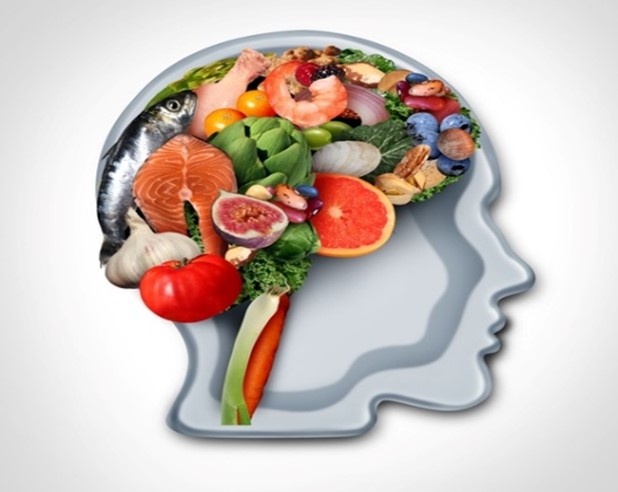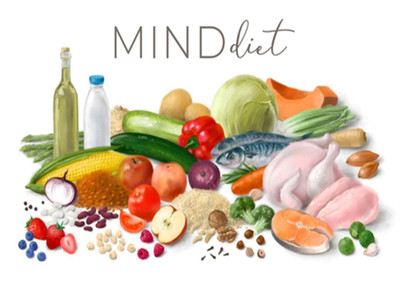MIND Diet: How Seattle Sutton's Healthy Eating Can Help
A new dietary acronym we might start getting used to hearing, as it relates to brain health and nutrition, is appropriately known as the MIND diet. Mediterranean-DASH Intervention for Neurodegenerative Delay (MIND) was developed by Rush University Medical Center nutritional epidemiologist Martha Clare Morris, ScD, and her colleagues in 2015. After much research it was determined that the heart healthy Mediterranean Diet and DASH Diet were the perfect combination for brain health.

DASH Diet
The DASH Diet (Dietary Approaches to Stop Hypertension) was developed to help treat or prevent high blood pressure (hypertension) and diabetes; conditions that have also been shown to increase cognitive decline. The DASH diet focuses on the consumption of fruits, vegetables, whole grains, nuts, seeds and legumes, lean meats (fish and poultry), and low- or non-fat dairy. With little consumption of sweets and sodium. Research indicates that the DASH diet along with aerobic exercise, was positively associated with a slower rate of cognitive decline in older individuals.
Mediterranean Diet
The Mediterranean Diet incorporates different aspects of healthy eating that are typically found in the areas bordering the Mediterranean Sea. The Mediterranean diet is a primarily plant-based eating plan that includes daily intake of whole grains, olive oil, fruits, vegetables, beans and other legumes, nuts, herbs, and spices. Other foods like animal proteins are eaten in smaller quantities, with the preferred animal protein being fish and seafood, which are recommended to be eaten at least twice a week.
Although the Mediterranean Diet suggests the proportion of foods to eat (e.g., eat more fruits and vegetables and less dairy foods), it does not specify portion sizes or specific amounts. It is up to the individual to decide exactly how much food to eat at each meal, as this will vary by physical activity and body size. A published study suggest that greater adherence to the Mediterranean diet is associated with slower cognitive decline and lower risk of developing Alzheimer’s disease.

MIND Diet
The MIND (Mediterranean-DASH Diet Intervention for Neurodegenerative Delay) diet is a hybrid of the Mediterranean and DASH diets. There is an emphasis on berries and green leafy vegetables, as well as other vegetables, nuts, beans, whole grains, fish, poultry, and olive oil. It is recommended to consume much smaller amounts of red meat, butter, stick margarine, cheese, pastries and sweets, and fried and fast food.
The 2015 study completed by Morris and her colleagues found that participants who strictly followed the MIND diet experienced a 53% reduction in risk of developing Alzheimer’s. Those who moderately adhered to the diet had a 35% reduction in risk. Although the aim of the MIND diet was on brain health, it was also noted that it benefits heart health, diabetes, and certain cancers because it includes components of the Mediterranean and DASH diets, which have been shown to lower the risk of these diseases.
Another follow-up study with approximately 600 senior adults in Chicago and Boston was conducted from January 2017 and completed in June 2021. This study utilized participants that began in 1997 with an ongoing Memory and Aging Project at Rush. The researchers examined the association of diet with brain pathologies and cognitive function in older adults from the start of the study until the death of the participant. This study concluded that those participants who had the best brain health consumed at least 3 servings of whole grains, a green leafy vegetable, one other vegetable per day; snacked most days on nuts; had beans every other day, or so; ate poultry and berries at least twice a week; and ate fish at least once a week. These participants also limited their intake of butter to less than 1 ½ teaspoons a day and ate less than a serving a week of sweets and pastries, whole fat cheese and fried or fast food. Based on this frequency intake report, which was based on a calculated MIND diet score, it was found that a higher MIND diet score was associated with better memory and thinking skills, may help slow cognitive decline and contributes to overall better brain health.
The research seems to demonstrate that the combination of the Mediterranean and DASH diets could directly prevent the onset or slow the progression of dementia. These diets highlight plant-based foods and limit the intake of animal and high saturated fat foods. The healthy foods the MIND diet suggests includes whole grains, vegetables (other than green leafy), green leafy vegetables, berries, nuts, beans, poultry, fish and mainly olive oil if added fat is used. The unhealthy foods the MIND diet suggests limiting include foods that are higher in saturated and trans-fat, such as pastries, sweets, red meat (including beef, pork, lamb, and products made from these meats), cheese, fried foods, butter and stick margarine.
The research also points out that providing alcohol in the studies was not a focus because each individual is complex, so there is no recommendation about alcohol for the MIND diet. There are unique benefits and risks for each person. Please speak to your healthcare provider about your own personal needs.

How Can Seattle Sutton’s Healthy Eating Help Your Brain?
The MIND diet can be a healthful eating plan that incorporates dietary patterns from both the Mediterranean and DASH Diets, both of which have known benefits in preventing and improving cardiovascular disease and diabetes and supporting healthy aging. After these recent research findings, it now seems that combining these two well-known diets can improve brain health!
For 38 years, Seattle Sutton’s Healthy Eating has followed the principles of the Mediterranean and DASH Diet to design a healthy menu for you. Our meal program is scientifically designed with meals formulated by our dietitians and created by our head chef. Our meal plans help improve people’s eating habits, assist with weight loss, and address health issues such as diabetes, hypertension, heart disease, and obesity! And as an added bonus-- our meals may also improve brain health!
Seattle Sutton’s meals include all the food suggestions of the MIND diet including whole grains, vegetables (other than green leafy), green leafy vegetables, berries, nuts, beans, poultry, fish and mainly olive oil if added fat is used. The meals at Seattle Sutton’s also limit or do not contain the foods the MIND Diet suggests limiting, including foods that are higher in saturated and trans-fat, such as pastries, sweets, red meat (including beef, pork, lamb, and products made from these meats), cheese, fried foods, butter, and stick margarine.
The brain is considered the most complex part of the human body. According to the National Institutes of Health, it is the “seat of intelligence, interpreter of the senses, initiator of body movement, and controller of behavior.” At Seattle Sutton’s Healthy Eating we suggest you take excellent care of it!
Let us help you today!







 Weight Loss
Weight Loss Health & Wellness
Health & Wellness Diabetes
Diabetes Heart Health
Heart Health Motherhood & Family
Motherhood & Family Dietary Restriction
Dietary Restriction Other Health Conditions
Other Health Conditions About SSHE
About SSHE


